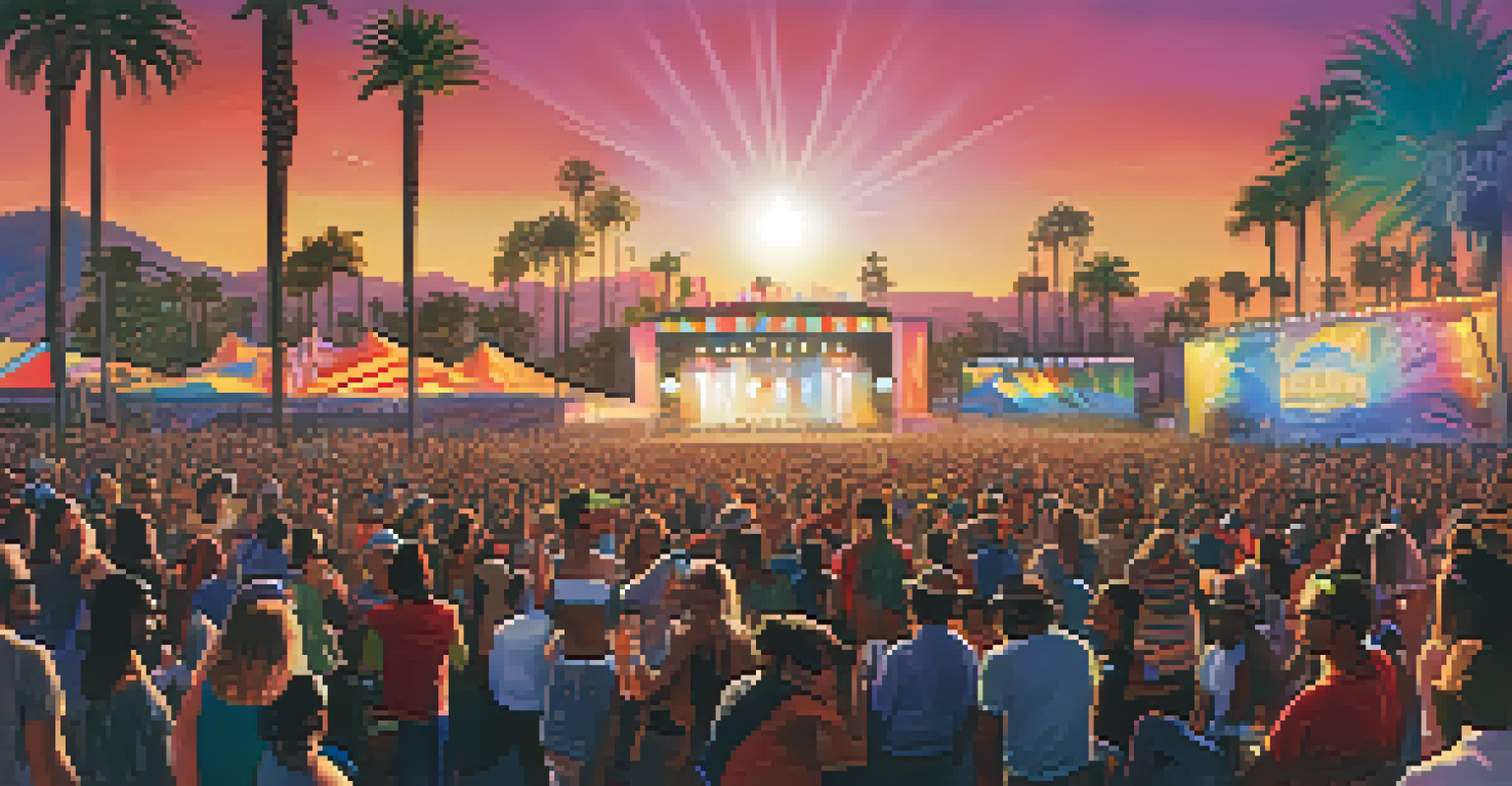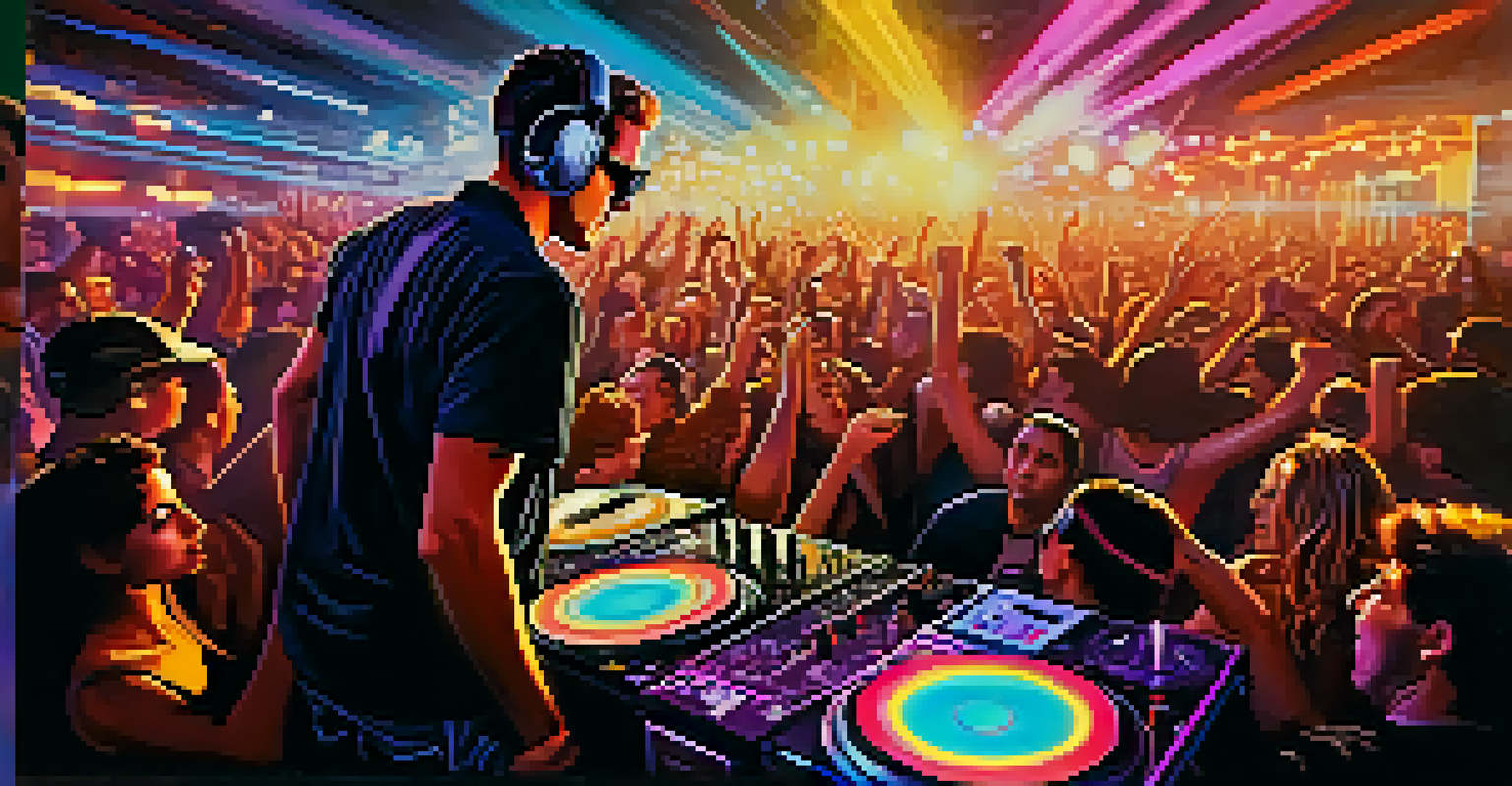Los Angeles: A Melting Pot of Musical Styles and Cultures

The Diverse Musical Heritage of Los Angeles
Los Angeles is often referred to as a melting pot, and this is particularly true in its music scene. The city’s rich musical heritage is influenced by a myriad of cultures, from Latin rhythms to the soulful sounds of jazz and blues. This diversity creates a unique tapestry that reflects the experiences of its inhabitants, making LA a hotspot for innovation in music.
Los Angeles is a cultural melting pot, where the music reflects the diversity of its people.
One can stroll through the streets of LA and hear the vibrant sounds of mariachi bands, hip-hop artists, and rock musicians all blending together. For example, the bustling neighborhoods of East LA and South Central are known for their contributions to the Chicano rock and hip-hop movements, showcasing how cultural identities can shape musical genres. This dynamic environment encourages artists to experiment, creating new sounds that often transcend their origins.
Moreover, the presence of iconic venues like the Hollywood Bowl and the Staples Center provides a platform for both emerging and established artists to share their diverse sounds. These spaces not only host concerts but also foster a sense of community among music lovers, uniting people from various backgrounds to celebrate their shared passion for music.
The Impact of Latin Music on LA's Soundscape
Latin music's influence in Los Angeles is impossible to overlook, as the city has one of the largest Hispanic populations in the United States. Genres such as salsa, cumbia, and reggaeton have carved out a significant place in LA’s music scene, captivating audiences and inspiring countless artists. The vibrant sounds of these genres often fill the air in neighborhoods like Boyle Heights and Westlake, where cultural celebrations frequently take place.

Artists like Carlos Santana and Los Tigres del Norte have not only brought Latin sounds to mainstream music but have also paved the way for newer artists like Rosalía and Bad Bunny. Their success demonstrates how Latin music can cross cultural boundaries and appeal to a broader audience, enriching the overall musical landscape of Los Angeles. This fusion is evident in collaborations that blend Latin beats with pop, rock, and hip-hop elements.
LA's Musical Diversity Shines Bright
Los Angeles boasts a rich musical heritage influenced by various cultures, creating a dynamic environment for innovation in music.
Additionally, events like the annual Coachella festival have increasingly featured Latin music acts, highlighting the genre's growing popularity and acceptance. As a result, audiences are treated to a delightful mix of sounds that celebrate both traditional and contemporary styles, bridging gaps between cultures and showcasing the city’s diverse musical identity.
The Rise of Hip-Hop Culture in LA
Hip-hop culture has roots deeply embedded in Los Angeles, making it a significant part of the city’s musical identity. The genre emerged from the struggles and stories of marginalized communities in the 1980s and has since evolved into a global phenomenon. Artists like N.W.A, Tupac Shakur, and Kendrick Lamar have used their music to address social issues, illustrating the power of hip-hop as a form of expression.
Music is the universal language of mankind, and in Los Angeles, it speaks in many dialects.
The streets of LA are alive with the sounds of hip-hop, from underground cyphers to mainstream radio hits. This genre not only reflects the city’s cultural diversity but also serves as a platform for voices that often go unheard. The annual BET Experience and the Grammy Awards frequently showcase hip-hop artists, highlighting the genre's impact and importance in the music industry.
Moreover, the collaborative spirit of hip-hop encourages artists from various backgrounds to work together, creating a unique blend of styles and sounds. This fusion has led to the emergence of sub-genres such as G-funk and West Coast hip-hop, further enriching the musical landscape of Los Angeles and drawing in fans from around the globe.
Rock and Its Evolution in Los Angeles
Los Angeles has a storied history in rock music, serving as a breeding ground for legendary bands and artists. The Sunset Strip became a cultural epicenter in the 1960s and 70s, with venues like The Whisky a Go Go and The Roxy hosting iconic performances that shaped rock music. Bands such as The Doors, Guns N' Roses, and Fleetwood Mac emerged from this vibrant scene, leaving an indelible mark on the genre.
As rock music evolved, so did its sound in Los Angeles, incorporating influences from punk, pop, and even electronic music. The city became a hub for experimentation, with artists pushing the boundaries of what rock could be. This evolution can be seen in the rise of sub-genres like pop-punk and alternative rock, which have roots in the diverse influences found within LA’s music community.
Latin Music's Growing Influence
The vibrant sounds of Latin music, such as salsa and reggaeton, greatly enrich LA's music scene and appeal to a diverse audience.
Additionally, today’s artists continue to pay homage to the rock legends that came before them while also integrating modern sounds. Festivals like The Troubadour’s annual events celebrate this legacy, offering a platform for both established and emerging artists to showcase their talents and keep the spirit of rock alive in Los Angeles.
The Role of Technology in Shaping LA’s Music Scene
In recent years, technology has played a crucial role in transforming the music industry, and Los Angeles is at the forefront of this change. The rise of digital platforms has made it easier for artists to share their work, connect with fans, and collaborate with other musicians around the world. With tools like social media and music streaming services, the barriers to entry have significantly lowered, allowing diverse voices to be heard.
For example, platforms like SoundCloud and YouTube have launched the careers of countless artists who may not have had access to traditional music distribution channels. This democratization of music production has led to a surge in creativity, as musicians experiment with different styles and genres. It has also given rise to new genres, such as lo-fi hip-hop, which blends elements from various influences to create a unique listening experience.
Moreover, technology has also impacted live performances, with innovations such as virtual concerts and augmented reality experiences. This adaptation not only enhances the audience's experience but also allows artists to reach a global audience, further solidifying Los Angeles as a hub for musical innovation.
Cultural Festivals Celebrating Music and Diversity
Los Angeles hosts a plethora of cultural festivals that celebrate the city’s musical diversity and rich heritage. Events like the LA Pride Music Festival and the Hollywood Bowl's Summer Concert Series bring together artists from various backgrounds, creating a vibrant atmosphere of inclusivity. These festivals not only showcase music but also foster community and cultural exchange, allowing people to come together to celebrate their differences.
Another notable festival is the Los Angeles World Music Festival, which highlights the global influences that shape the city’s sound. Here, attendees can experience a variety of genres, from reggae to Afrobeat, reflecting the diverse cultures that make up Los Angeles. Such events provide a platform for artists from all walks of life to share their music and stories, further enriching the city’s cultural fabric.
Technology Shapes Music in LA
Advancements in technology are transforming how artists create, share, and perform music, making Los Angeles a hub for musical innovation.
Additionally, these festivals often emphasize the importance of social change and activism in music. Many artists use their platforms to raise awareness about pressing issues, turning their performances into powerful statements. This blend of entertainment and activism not only entertains but also educates audiences about the diverse cultures and issues present in Los Angeles.
The Future of LA’s Musical Landscape
As Los Angeles continues to evolve, so does its musical landscape, reflecting the changing demographics and cultural shifts within the city. The next generation of artists is emerging, bringing fresh perspectives and sounds that push the boundaries of musical expression. With a strong emphasis on collaboration and inclusivity, the future of LA’s music scene looks bright and promising.
In addition, the integration of technology into music production and distribution will likely continue to shape the way artists create and share their work. As new tools and platforms emerge, musicians in Los Angeles will have even more opportunities to innovate and connect with fans around the world. This evolution will ensure that the city remains a vital hub for musical creativity and experimentation.

Ultimately, the rich tapestry of sounds and cultures that define Los Angeles will continue to inspire artists and audiences alike. As the city embraces its diverse roots while also looking toward the future, it will undoubtedly remain a melting pot of musical styles and cultures, captivating listeners for years to come.